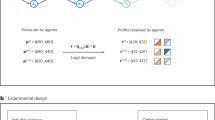Abstract
Betting markets provide an ideal environment in which to examinemonopoly power due to the availability of detailed information on product pricing. In this paper we argue that the pricing strategies of companies in the U.K. betting industry are likely to be an important source of monopoly rents, particularly in the market for forecast bets. Pricing in these markets are shown to be explicitly coordinated. Further, price information is asymmetrically biased in favor of producers. We find evidence, based on U.K. data, that pricing of CSF bets is characterized by a significantly higher markup than pricing of single bets. Although this differential can in part be explained by the preferences of bettors, it is reasonable to attribute a significant part of the differential as being due to monopoly power.
Similar content being viewed by others
References
Ali, M. M. (1977) ‘Probability and Utility Estimates for Racetrack Bettors’, Journal of Political Economy, 84, 803–815.
Bird, R., M. McCrae, and J. Beggs (1987) ‘Are Gamblers Really Risk Takers?’, Australian Economic Papers, 237–253.
Bruce, A. C. and J. E. V. Johnson (1996) ‘Toward and Explanation of Betting as a Leisure Pursuit’, Leisure Studies, 11, 201–218.
Busche, K. and C. D. Hall (1988) ‘An Exception to the Risk Preference Anomaly’, Journal of Business, 61, 337–346.
Cain, M., D. Law, and D. A. Peel (1997) ‘Insider Trading and Market Efficiency in British Racetrack Betting’, Salford Papers in Gambling Studies, 97–101.
Crafts, N. F. R. (1985) ‘Some Evidence of Insider Knowledge in Horse Race Betting in Britain’, Economica, 43, 139–150.
Crafts, N. F. R. (1994) ‘Winning Systems? Some Further Evidence on Insiders and Outsiders in British Horse Race Betting’, in D. B. Hausch, Victor S. Y. Lo, and W. T. Ziemba, eds., Efficiency of Racetrack Betting Markets. London: Academic Press, pp. 545–549.
Dowie, J., M. Coton, and D. M. Miers (1991) ‘Consumer Protection in Betting’, in W. R. Eadington and J. A. Cornelius, eds., Gambling and Public Policy: International Perspectives. Reno, Nev.: College of Business Administration, University of Nevada, pp. 431–444.
Filby, M. P. and L. Harvey (1988) ‘Recreation Betting: Everyday Activity and Strategies’, Leisure Studies, 7, 159–172.
Gabriel, P. E. and J. R. Marsden (1990) ‘An Examination of Market Efficiency in British Racetrack Betting’, Journal of Political Economy, 98, 874–885.
Gabriel, P. E. and J. R. Marsden (1991) ‘An Examination of Market Efficiency in British Racetrack Betting: Errata Corrections’, Journal of Political Economy, 99, 657–659.
Golec, J. and M. Tamarkin (1998) ‘Bettors Love Skewness, Not Risk, at the Horse Track’, Journal of Political Economy, 106, 205–225.
Harville, D. A. (1973) ‘Assigning Probabilities to the Outcomes of Multi-Entry Competitions’, Journal of the American Statistical Association, 58, 312–316.
Hausch, D. B., Victor S. Lo, and W. T. Ziemba (1994) ‘Introduction to Economics and Mathematical Insights’, in D. B. Hausch, Victor S. Y. Lo, and W. T. Ziemba, eds., Efficiency of Racetrack Betting Markets. London: Academic Press, pp. 87–91.
Hausch, D. B., W. T. Ziemba, and M. R. Rubinstein (1983) ‘Efficiency of the Market for Racetrack Betting’, Management Science, 27, 1435–1452.
Henery, R. J. (1981) ‘Permutation Probabilities as Models for Horse Races’, Journal of the Royal Statistical Society B, 43, 86–91.
Lo, Victor S., John Bacon-Shone, and Kelly Busche (1995) ‘The Application of Ranking Probability Models to Racetrack Betting’, Management Science, 41, 1048–1059.
Martin, Stephen (1993) Advanced Industrial Economics. Oxford: Blackwell.
Monopolies and Mergers Commission (1998) Ladbroke Group PLC and the Coral Betting Business: A Report on the Merger Situation. Monopolies and Mergers Commission.
Pregibon, D (1979) ‘Goodness of Link Tests for Generalized Linear Models’, Applied Statistics, 29, 15–24.
Quandt, R. E. (1986) ‘Betting and Equilibrium’, Quarterly Journal of Economics, 101, 201–217.
Sauer, R (1998) ‘The Economics of Wagering Markets’, Journal of Economic Literature, 36(4), 2021–2064.
Shin, H. S. (1993) ‘Measuring the Incidence of Insider Trading in a Market for State-Contingent Claims’, Economic Journal, 103, 1141–1153.
Stern, H. (1990) ‘Models for Distributions on Permutations’, Journal of the American Statistical Association, 85, 558–564.
Vaughan Williams, Leighton (1999) ‘Information Efficiency in Betting Markets: A Survey’, Bulletin of Economic Research, 51, 1–30.
Vaughan Williams, Leighton and David Paton (1997) ‘Why Is There a Favourite-Longshot Bias in British Racetrack Betting Markets?’, Economic Journal, 107, 150–158.
Author information
Authors and Affiliations
Rights and permissions
About this article
Cite this article
Paton, D., Vaughan Williams, L. Monopoly Rents and Price Fixing in Betting Markets. Review of Industrial Organization 19, 265–278 (2001). https://doi.org/10.1023/A:1011828216881
Issue Date:
DOI: https://doi.org/10.1023/A:1011828216881



